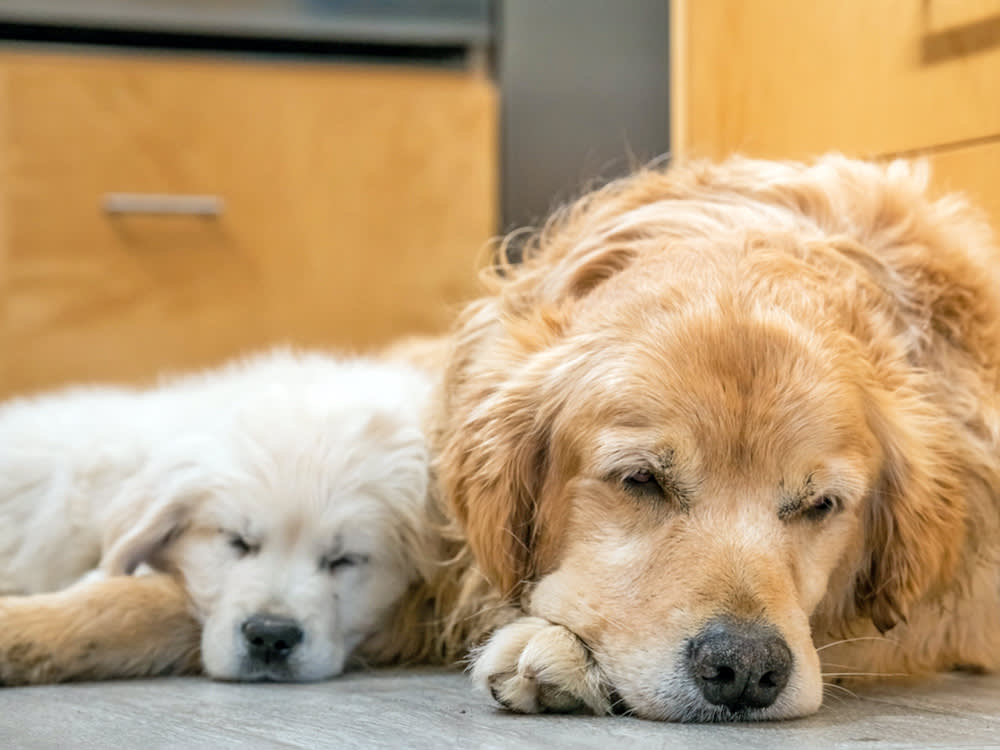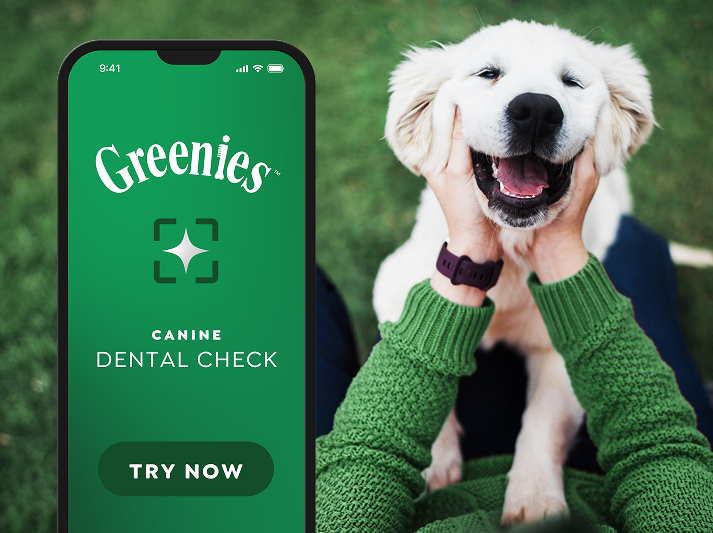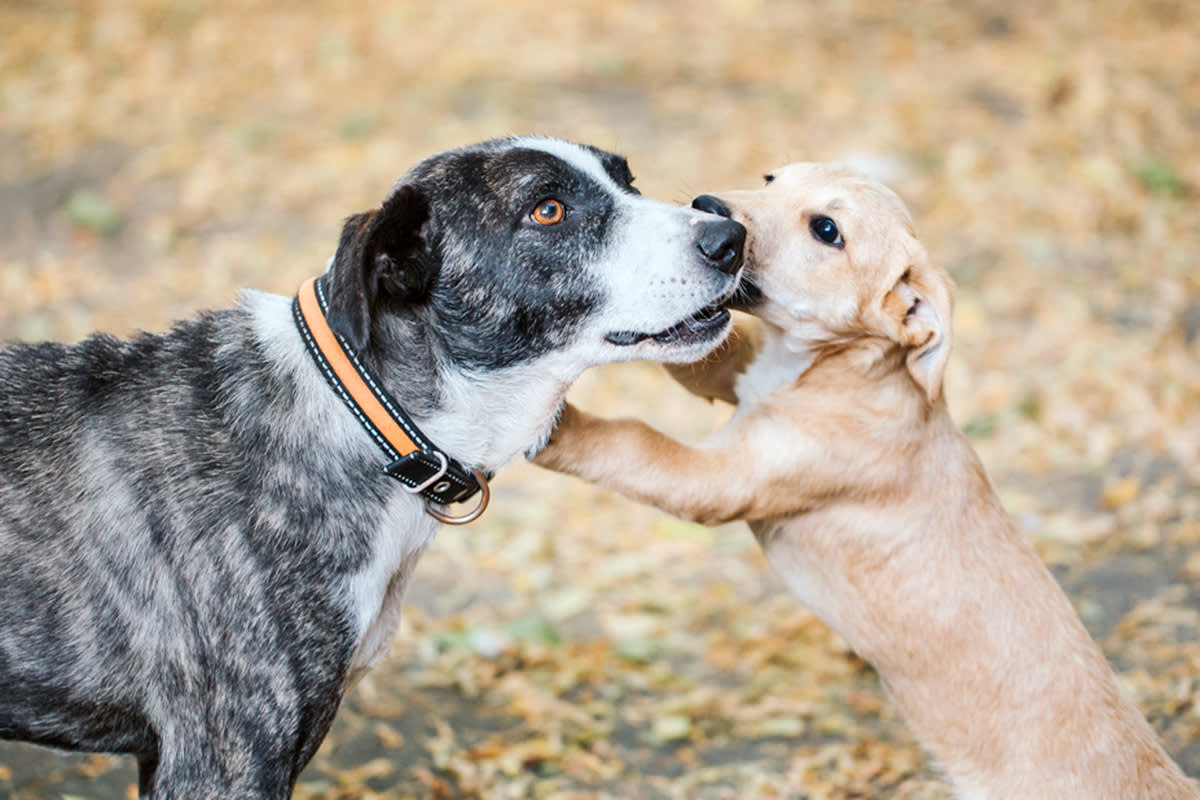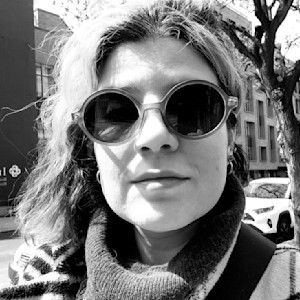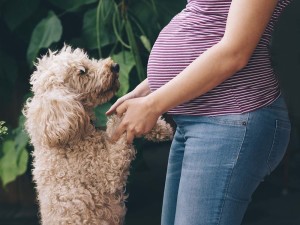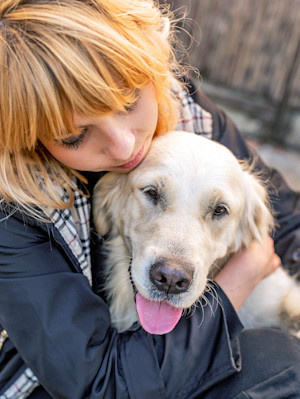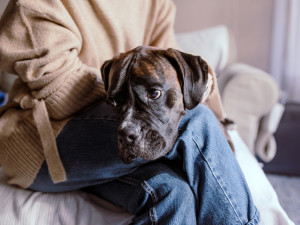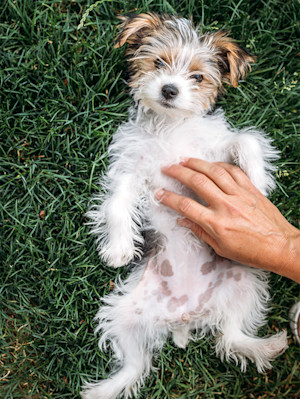‘My Puppy Alerted Me to My Other Dog’s Cancer.’ Is This Really a Thing?
We asked the experts if dogs can really detect cancer—and whether untrained pups can do it, too.
Growing up, my grandparents had a neighbor with a Golden Retriever named Blondie. Every day, Blondie would run outside, grab the newspaper, and bring it inside. As a young child, I considered her a legend — and that was before my grandparents began telling me the story about how she’d helped her human realize he had cancer.
One day, my grandparents said, Blondie began acting strangely. She’d always been affectionate with her human, but suddenly, she avoided him. Sometimes, she cried. Eventually, her dog dad learned that he was sick, and once he’d recovered, her behavior returned to normal. I never forgot about the miracle dog who sniffed out his illness, even long after she passed.
Snap a pic of your pup’s teeth, and GREENIES™ will help you spot potential signs of oral health issues.
Blondie’s not the only dog to pull this off. Earlier this year, a Redditoropens in new tab described how her puppy began licking their older Rottweiler’s shoulder incessantly.
“I didn’t really think anything of it,” they wrote. But after a week or so of “constant licking,” they felt the older dog’s shoulder and noticed a “tiny hard lump that I would never have felt if I wasn’t looking for something.” After calling the vet, they discovered it was a mast cell tumor.
How much do you spend on your pet per year?
“If it wasn’t for my puppy’s constant licking, I probably wouldn’t have found this for a while and who knows how much it could have spread by then,” the Redditor wrote. “All this is to say if one of your dogs won’t leave a specific part of your other dog alone, don’t ignore it! They might know something you don’t.”
It turns out, dogs are very, very good at sniffing out cancer. Research has shown that trained sniffer dogs can detect lung canceropens in new tab, ovarian canceropens in new tab, prostate canceropens in new tab, and more. But can untrained dogs really do the same thing?
Yes, dogs can absolutely smell cancer.
Anecdotally, the answer is yes, probably — but it’s complicated. According to In Situ Foundationopens in new tab CEO Dina Zaphiris, a bio-detection dog trainer who worked on twoopens in new tab published studiesopens in new tab in the field, dogs can absolutely smell cancer. The bigger issue when it comes to untrained dogs is that you can never know for sure if that’s why they won’t stop sniffing you.
Dogs interact with the world via smell, Zaphiris says, so they’re processing all kinds of olfactory information every day. If a dog walks into a bedroom and concentrates, she says, “he can smell the drawers, the clothes in the drawers, who touched the handle, the vase on the counter, the lamp, the light, the lampshade, what it's made of, the footsteps on the floor.”
Our dogs can smell our zits just as well as they can smell our perfume, so according to Zaphiris, cancer is no different. The problem is that because our dogs can smell so many things, there’s no way to know for sure what might catch an untrained dog’s interest. Going back to the anecdote about the puppy and the Rottweiler, for example, if your dog is intently smelling another dog, Zaphiris asks, “How do you know they’re not sniffing a tick, or sniffing a scratch, or sniffing a wound, or sniffing something else, or they rolled in skunk?”
It’s important to distinguish properly trained dogs in a laboratory setting from a pet dog who might’ve detected cancer once, Zaphiris says. At times, she says, people have gone into public places with a pet dog who had done just that, claiming they had a cancer-sniffing dog. “It made the science a lot harder to be believed,” she says, “because there were a lot of people that went rogue. ... And it could have been true. The dog probably did find their cancer. But it’s not a dog that could be reliable in a laboratory setting.”
That’s not to say that all stories about dogs smelling cancer are bunk. The science on cancer-sniffing dogs actually began with anecdotal reports about pups who’d detected their owners’ cancer. “It was not magic,” Zaphiris says. “It was that the dog noticed something changing … the same way if you had a cut on your leg or a festering wound, the dog would probably smell it and lick it.”
There’s still a lot more to learn.
According to MacKenzie Pellin, associate professor of oncology at the University of Wisconsin Veterinary School, the research in this field is still relatively new. Scientists believe that when our dogs smell cancer, they are noticing volatile organic compounds that are basically altered proteins. It’s possible that cancer cells release these compounds, or that our bodies release them in response to the cancer. “That’s what [dogs] are smelling that's different,” she says.
So far, most research into dogs detecting cancer has examined human cancer, tasking dogs with detecting it in breath samples, sweat samples, urine, and feces. Pellin and her colleagues’ studyopens in new tab was only the second to examine trained dogs’ ability to catch it in other dogs. The first found that the dogs could not reliably confirm cancer in dogs who had bladder tumors based on urine samples, and researchers wondered if the dogs were getting too much information. (Dogs do famously learn a lot about each other through urine.)
So Pellin’s study used saliva instead, scrubbing the inside of dogs’ cheeks to see if trained dogs could identify whether or not they had cancer. The dogs studied had cancers in various parts of their bodies. The result? The dogs could distinguish between healthy and sick dogs with an average sensitivity of 90 percent (meaning, they caught cancers 90 percent of the time) and an average specificity of 98 percent — which means they avoided flagging a healthy patient 98 percent of the time.
Given how skilled dogs can be at detecting cancer, it’s easy to wonder why we don’t already use them more. According to Zaphiris, there are a number of obstacles. For one thing, false positives can be disastrous — financially, legally, and reputationally. The training required for these dogs is also very expensive.
“Not only that,” Zaphiris says, “but how are you going to regulate the dogs and make them equal across the board? Science doesn't like when things are different.” Dogs are not machines; different breeds work differently, and with different accuracy, and all dogs need breaks and lives outside of the work, which makes deploying them resource-intensive.
At the same time, the goal of cancer-sniffer research is not to replace traditional diagnostics. That, Zaphiris says, would be “ridiculous.” Instead, the idea is to add another sensory plane for detection. Experts can detect some tumors by sight by noticing them on a scan; they can listen for some tumors in the heart and lungs, looking for palpitations; they can feel for some tumors with their hands. By deploying dogs’ sense of smell, Zaphiris says, we could “add another tool to the toolbox.”
Dogs might be very useful to cancer diagnosis in the future.
Looking ahead, Pellin believes one application of sniffer-dog research could be to monitor cancer patients’ remission. “So, can we detect when cancer is coming back after the initial treatment, or can we use this for a very early diagnostic so that we can detect cancer before, clinically, we would have been able to and then hopefully we can have a better outcome?” Another possible application, at least for some cancers, could be a test like Cologuard, in which human patients could send samples to a lab for dogs to inspect and return a positive or negative result.
For now, however, we are a long way away from those possibilities. Researchers still need to explore detection thresholds, as well as how different medicates and treatments could alter the smells that dogs perceive. “There's just way, way, way more questions than answers at this point,” Pellin says.
Still, she says, the possibilities are exciting. For now, she says, it’s just important to remember that while our dogs can probably smell all sorts of conditions, including when someone is hypoglycemic, “we don’t want to freak people out that if their dog is suddenly sniffing their arm or leg, they have cancer.”
Most dogs need training in order to focus their abilities and make sure they’re only pointing out the things we need them to mark. After all, Pellin says, “I just watched a film this weekend about all the training dogs have to go through for search and rescue dogs. They have to be trained to ignore the box of French fries, which my dogs absolutely would not do.”
